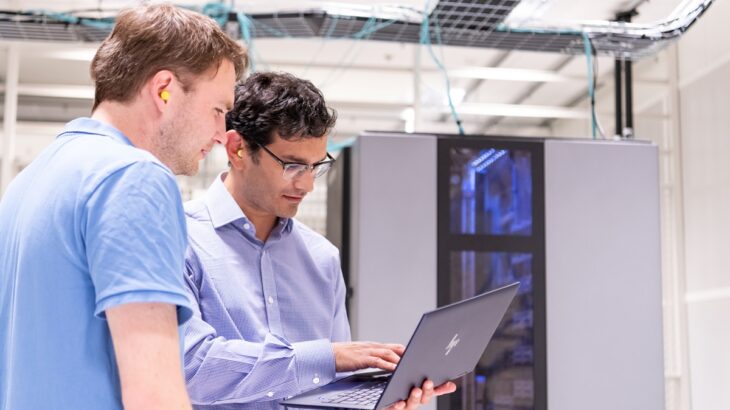Supporting digital Research Technical Professionals: Building a community, shaping careers

With a growing recognition of the technical skills needed to underpin modern research, a UKRI-funded project has been launched to support a community of professionals with these skills. In this blog, project leader Jeremy Cohen describes STEP-UP and how it will give this community the infrastructure they deserve.
The role that technical professionals play in supporting the research community is vital, but not always recognised, as previously highlighted in an SES blog post.
In the two years since that was written, the concept of the Research Technical (or Research Technology) Professional (RTP) has continued to develop. There is growing recognition of the breadth of supporting technical skills that underpin modern research giving greater clarity to the scope of RTPs’ skills. It is now widely recognised that the RTP space covers everything from the design, management and operation of specialist research facilities, through to digital skills in the areas of software, data and computing infrastructure.
In order to better represent different subsets of the RTP space, the concept of the “digital Research Technical Professional” (dRTP) has emerged. dRTPs focus on the design, development and maintenance of software, the management and analysis of data and the design, deployment and operation of research computing infrastructure. As with all RTP roles, dRTP roles also frequently involve actively contributing to research and the development of research outputs and results.
So, we have a name – the digital Research Technical Professional – but does that give us a career, recognition, job opportunities, a future? Not quite yet! However, as the demand for specialist digital research skills grows, so does the need for better structures, training, career options and, ultimately, recognition for research professionals specialising in technical work. We’re starting to see things shift and we’re also seeing funders helping to underpin these changes through initiatives such as EPSRC’s 2023 Strategic Technical Platforms call. This resulted in the funding of 11 projects, covering both general and digitally-focused RTP support.
One of the projects funded under this call is STEP-UP – “a Strategic TEchnical Platform for University technical Professionals”, which received £2m of funding. STEP-UP is a regional platform bringing together three SES members, Imperial College London, UCL and King’s College London, with the University of Westminster, to develop a range of support for dRTPs.
STEP-UP is based around the idea that we are trying to solve a number of challenging issues in developing improved support for dRTPs, and tackling these issues at a regional level, between a group of geographically local institutions offers a number of benefits and opportunities. As we develop approaches, processes and outputs from the project work, STEP-UP will then look to take these to the wider national, and potentially international, communities, offering benefits far beyond the core platform.
But what can we actually do to grow support for dRTPs, develop a realistic career path and give people in these roles the recognition they deserve? While this is likely to be a lengthy process that can’t be solved by a single project, STEP-UP is pioneering a range of activities that we believe will make a real difference to developing the digital RTP community:
Building communities: We’ve seen the importance of the UK Research Software Engineering community in advocating for the development of the RSE role over the past decade. We’ve also seen the value of regional communities, such as Research Software London, and local communities at individual research institutions, in helping to develop awareness of the RSE role and support the development of new RSE teams. Building on this recognition of the value and importance of communities, STEP-UP is working to develop new Communities of Practice focused on growing a diverse, inclusive and accessible environment for dRTP careers across the areas of software, data and computing infrastructure.
Secondments and mentoring: University role structures have been developed over many decades to support a longstanding and widely accepted model. While we advocate for, and actively work with partners to support change, there are other things that we can do to enhance career opportunities. One is the development of a secondment scheme enabling technical professionals to move both within and between institutions for short periods to gain new skills as well as providing options to bridge between different funding streams, ultimately enhancing job security. Alongside this, a mentoring scheme will help to give technical professionals access to new skills and greater understanding of the RTP domain while building links with people at a range of levels in different institutions.
Training and skills: Training and access to skills is the key to developing both the existing and next generation of technical professionals, and addressing the current significant skills shortage in this area. Understanding what to learn when and how to go about it is difficult. STEP-UP is working to develop a training infrastructure underpinned by pathways that will provide a more structured route to skills development. This is being undertaken alongside the continuation of a variety of community training activities developed through RSLondon and by project team members.
much modern research wouldn’t be practical without dRTP skills, whether delivered by researchers themselves, or by dedicated technical professionals
Jeremy Cohen, PI of STEP-UP
Awareness and recognition: Behind all of these aspects of enhancing support for dRTPs is the need to increase awareness and recognition of the roles they undertake, the contribution they make and the value they add to research. Indeed, much modern research wouldn’t be practical without dRTP skills, whether delivered by researchers themselves, or by dedicated technical professionals. We know that advocacy and engagement work in helping to raise awareness of the need for dRTPs with institutional leadership and other key stakeholders, so why not join us in working together to diversify the research environment, provide better recognition for everyone involved in contributing to the UK’s world class research outputs and helping to make a difference?
If any of the ideas and initiatives highlighted in this article sound like things you’d like to get involved with, or if you’re already doing relevant or related work and would like to engage with the STEP-UP platform, please do get in touch.
STEP-UP Contact

Jeremy Cohen
Dr Jeremy Cohen is an Advanced Research Fellow in the Department of Computing and Director of Research Software Engineering Strategy at Imperial College London. He is PI of STEP-UP (a Strategic TEchnical Platform for University Technical Professionals), a project recently funded by UKRI-EPSRC that brings together Imperial College London, King’s College London, UCL and University of Westminster with a group of external project partners to develop support for digital Research Technical Professionals (dRTPs).

